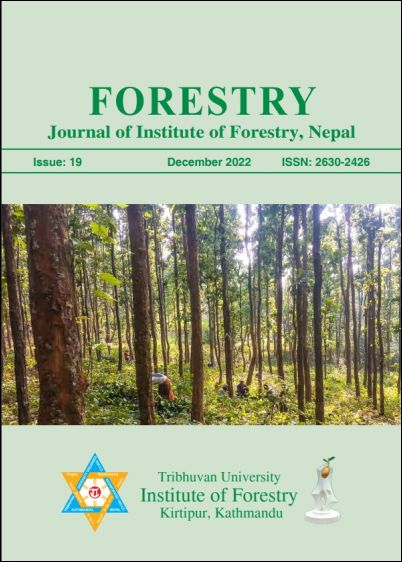A Comparison of Landsat-8 and Sentinel-2 spectral indices for estimating aboveground forest carbon in a community forest
DOI:
https://doi.org/10.3126/forestry.v19i01.55703Keywords:
Community Forest, Remote sensing, Above ground biomass, Forest inventory, Simple linear regression modelAbstract
This study aimed to estimate and map the Above Ground Forest Carbon stock in the Salbote Karele Community Forest in Ilam district. The research used field surveys and satellite data from Sentinel-2 and Landsat-8 to determine biomass and carbon stocks. A total of 30 inventory plots covering 283.56 hectares (ha) were surveyed, resulting in an estimated mean biomass of 156.48 ton ha-1 and carbon stock of 73.55 ton ha-1. The biomass was then correlated with five different Vegetation Indices (VIs), computed from Sentinel-2 and Landsat-8 image and used to develop various simple linear regression models. The study found that Sentinel-2 data showed the highest correlation with observed biomass (R2 = 0.76) and lowest prediction error (RMSE = 78.44 ton ha-1) compared to Landsat-8 data. The linear regression model developed from Sentinel-2’s NDVI (Normalized Difference Vegetation Index) data predicted a mean AGB of 129.82 ton ha-1 and AGC of 61.01 ton ha-1. This research highlights the importance of using Sentinel-2 data for estimating Above Ground Forest Carbon stocks due to its combination of spectral capabilities and broad applicability. It also shows that the Salbote Karele community forest is of great significance as it stores suitable amounts of carbon
Downloads
Downloads
Published
How to Cite
Issue
Section
License
This license enables reusers to distribute, remix, adapt, and build upon the material in any medium or format, so long as attribution is given to the creator. The license allows for commercial use.




